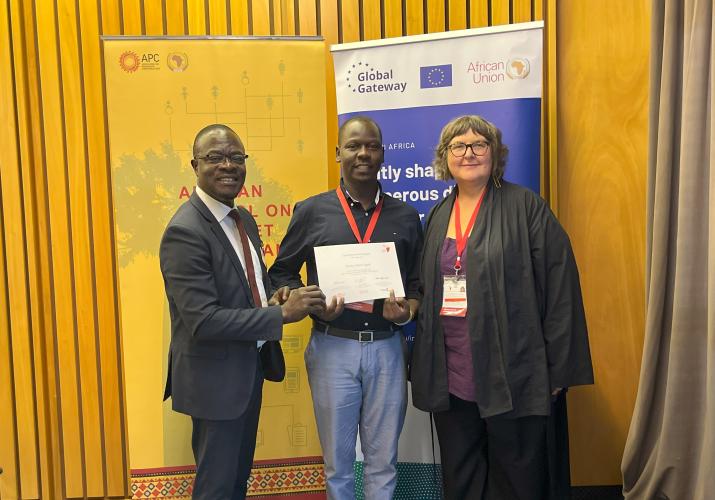
Introduction
From 14 to 19 November 2024, I had the incredible privilege of attending the 12th African School on Internet Governance (AfriSIG24) in Addis Ababa, Ethiopia. This immersive experience brought together an inspiring group of professionals from across Africa and beyond, representing civil society, government, academia, business and the technical community. Together, we engaged in thought-provoking conversations about Africa’s digital future, diving into topics like internet governance, data protection, cybersecurity, and the transformative potential of AI in shaping the continent’s digital economy.
It was more than just a week of learning – it was a chance to collaborate, exchange ideas, and strengthen my determination to contribute to policies that promote a secure, inclusive and equitable digital ecosystem for Africa.
The practicum: Hands-on policy development
One of the highlights of AfriSIG 2024 was the practicum – a hands-on exercise that brought the multistakeholder model of internet governance to life. As a representative of the technical community, I had the opportunity to contribute to a negotiated response to two critical annexes of the African Continental Free Trade Area (AfCFTA) Protocol on Digital Trade: Cross-Border Data Transfers and Criteria for Determining Legitimate Public Reasons for Disclosure of Source Code.
Our role as the technical community was to ensure that the proposed frameworks were not only aligned with broader goals like data sovereignty, privacy and innovation, but were also practical and feasible from a technical perspective. This process gave me a deeper understanding of the challenges and opportunities in balancing the interests of diverse stakeholders while ensuring that the technical infrastructure supports the policies being developed.
The practicum was both challenging and rewarding. It sharpened my negotiation and consensus-building skills, pushing me to think critically about how to ensure that all voices are heard in the decision-making process. This experience reaffirmed the importance of collaboration in creating robust and inclusive digital governance frameworks, and I look forward to applying these skills in my work.
Shaping Africa’s digital economy through collaboration
One of the most compelling discussions at AfriSIG24 was about the potential of the AfCFTA to drive digital transformation across the region. It became clear that cross-border data flows, supported by clear and fair policies, are essential for enabling trade, reducing inequalities and fostering innovation. We also explored how emerging technologies like AI and machine learning could unlock Africa’s potential while recognising the importance of safeguards to protect digital rights and promote inclusivity.
These discussions strengthened my commitment to advocating for policies that align with regional frameworks like the African Union Data Policy Framework and the AfCFTA Protocol on Digital Trade. I am particularly inspired to use my enhanced understanding of cross-border data governance and source code disclosure criteria to influence policies that strike a balance between data sovereignty and economic growth. It’s clear that Africa’s digital future depends on policies that foster innovation while ensuring that no one is left behind.
Empowering communities with knowledge and networks
The networking opportunities at AfriSIG24 were truly invaluable. I had the chance to connect with an amazing group of professionals from diverse sectors: civil society, government, academia, business and the technical community. These interactions not only deepened my appreciation for the multistakeholder model of internet governance, but also reinforced the importance of collaboration in addressing Africa’s complex digital policy challenges.
Whether through formal sessions, group discussions or informal conversations over coffee, I was able to build meaningful relationships with peers and experts who share a common vision for a secure, inclusive and equitable digital future for Africa. These connections will be incredibly valuable as I move forward in my career, providing me with access to a network of resources, expertise and potential collaborators who can support my projects and initiatives in digital governance and data policy.
The shared experiences during the practicum also laid the foundation for long-term partnerships. I’m excited to draw on these connections to advocate for impactful policies, share best practices, and drive regional collaboration as I continue my professional journey.
A call to action
AfriSIG24 wasn’t just an event – it was a call to action. The insights I gained have inspired me to advocate for inclusive and ethical digital governance policies. I plan to share the knowledge I gained through capacity-building workshops, community outreach, and active participation in internet governance forums. My goal is to foster a culture of responsible and inclusive internet governance both within my organisation and beyond.
This experience equipped me with the tools, confidence and motivation to meaningfully contribute to internet governance discussions and initiatives. It reaffirmed the importance of working together as a continent, bridging gaps between stakeholders, and prioritising human rights and digital equity.
Conclusion
AfriSIG24 was more than a fellowship – it was a transformative experience that highlighted the immense potential of Africa’s digital future and the critical role we all play in shaping it. The practicum showed me how multistakeholder collaboration can lead to meaningful solutions, and the discussions throughout the week emphasised the need for inclusive, ethical and forward-thinking governance.
With these takeaways, I’m more committed than ever to advancing digital rights, fostering innovation and ensuring that Africa’s digital transformation benefits everyone. Together, I believe we can turn the vision of an inclusive and empowered digital Africa into a reality.
Emmy Okwir Ogule of the Medical Concierge Group, Uganda, is a seasoned data governance practitioner and statistician with a robust background in data management, analysis, visualisation and stakeholder engagement across multiple sectors, including health, finance and private industry. He has a keen interest in data privacy and governance issues, artificial Intelligence and machine learning. His work has ensured data integrity, compliance, and the development of strategic solutions that support decision-making processes at an organisational level and the development of digital solutions that streamline data collection and processing, while adhering to data privacy and protection regulations and best practices.
